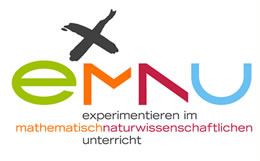Einzelprojekte
Framework concept
The doctoral programme exMNU is characterized by a comprehensive and innovative framework concept. The realisation of the doctoral programme is made possible by the cooperation and coordination between participating universities and by involving the Methods Centre of the University of Education in Freiburg.
The three pillars of the exMNU framework concept are:
1) Methodical individual consultation: the participants of the eleven individual projects are advised about further development of their research questions, the concretization and legitimisation of their research design, dealing with ethical challenges, the choice of their survey samples and their statistical analysis methods. This form of consultation occurs continuously at various points of time over the three years. The Methods Centre of the University of Education in Freiburg has a leading role in these consultations.
2) Accompanying doctoral programme: In addition to the methods training, the accompanying doctoral programme includes supervision towards active participation in the academic community, substantial interdisciplinary and meta-analytical work as well an introduction to research-based teaching.
3) Internal and external exchange of information and cooperation: the composition of scientists participating in the programme not only makes a subject wide exchange of information possible but also promotes an interdisciplinary cooperation between the various participating sciences (Biology, Chemistry, Physics, Maths, and pedagogical Psychology). An external exchange is stimulated by inviting guest speakers, participating at conferences and conventions as well as the possibility of doctoral candidates to reside at national or international research institutes.
The exMNU workshops, which take place three to four times a year, play a special role in the programme (see current topics). The main objectives of the workshops are to introduce and to discuss the results and developments of the doctoral candidate’s work, to guide the research process and to impart knowledge in a compact form on subject matter relevant to their education.
The arrangement of the accompanying academic programme is oriented on the content requirements of the doctoral candidates, on the research processes of the subject didactics, on the need for methods and standardization of empirical teaching research and on the development of the doctoral candidates as the next generation of researchers.
The accompanying doctoral programme is divided into the following areas:
Methods training: includes the courses offered by the Methods Centre of the University of Education in Freiburg for the acquisition of the university certificate “Evaluation and Empirical Research Methods” as well as the semi-annual events of the Winter Academy. Additionally, each university offers their own doctoral candidates further on campus training and exchange opportunities.
Inter-disciplinary and meta-analytic work: in this area, subject educationalists and researchers in teaching methods from various disciplines can discuss, for example, proposed course concepts or their understanding of specific key terms such as experimenting or problem solving in regards to their consequences for practical implementation in scholastic education. Special emphasis is placed on scientific results in subject areas within the entire network.
Active participation in the academic community: A prime focus of the doctoral programme in compliance with the academic structure of the Winter Academy is to support the exMNU doctoral candidates in gaining a differentiated self-image of their role as a scientist in research and teaching. The concentration is on the development of key competences in the areas of presentation, acquisition of research funds, composing publications, networking, possible forms of shaping a work/life balance and responsible time management.
Research based teaching: This area deals with the important issue of unifying research with teaching. Based on sound information and discussion, the doctoral candidates are encouraged to try out different forms of research based teaching during their teaching activities, for instance, the processes of research based learning.




